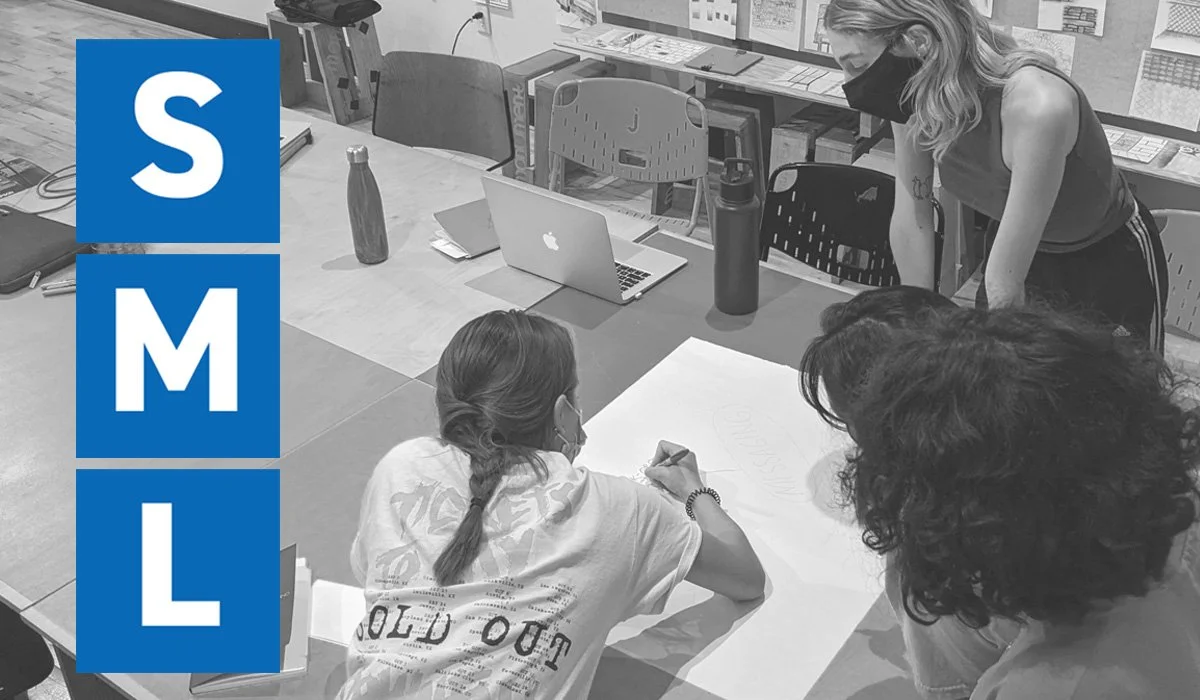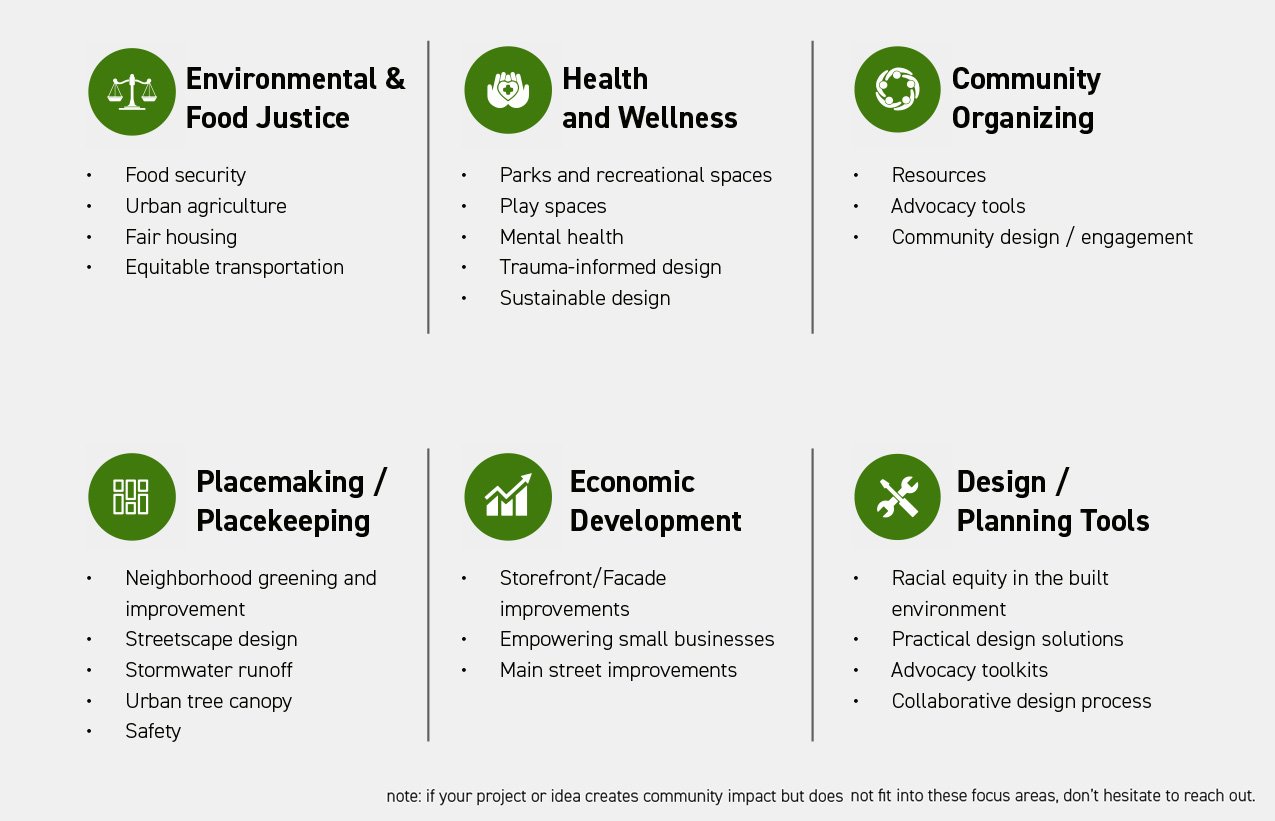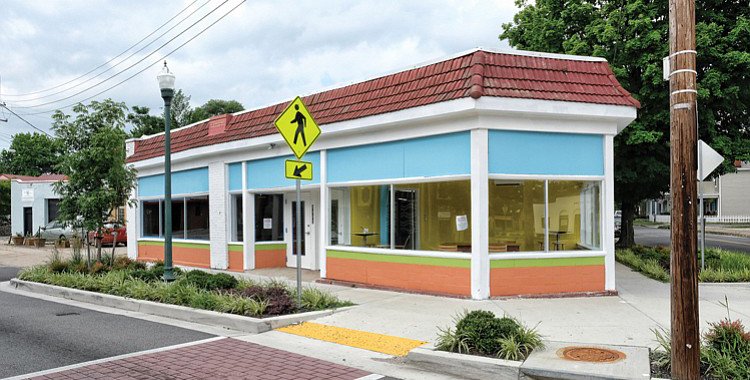
Storefront Launches New Low-cost Program Menu
With a goal to increase access to programming, we are excited to launch a new menu for our low-cost design and planning assistance programs! Storefront's program menu provides the opportunity for you to apply based on your needs and the size of your project or idea. Each low-cost program offers three size sessions or actions (small, medium, or large) that provide consultation and connects you to volunteers and design resources.
About Low-cost Design and Assistance
Storefront’s low-cost design and planning assistance program includes our Design Session Studio and Community Engagement Studio. Since 2011, Storefront has completed over 325 design sessions and 25 community engagement initiatives. This program has provided hundreds of Richmonders design and planning assistance at a low-cost that is subsidized by our generous supporters.
The need for low-cost design and planning assistance through our Design Session Studio and Community Engagement Studio has been evident and as community requests evolve, we will continue to adapt to the changing times to assist with varying community-initiated projects. Our program and project focus areas include Environmental and Food Justice, Health and Wellness, Community Organizing, Placemaking/Placekeeping, Economic Development, and Design/Planning Tools.
With a goal to increase access to programming, we are excited to launch a new menu for our low-cost design and planning assistance programs! Storefront's program menu provides the opportunity for you to apply based on your needs and the size of your project or idea. Each low-cost program offers three size sessions or actions (small, medium, or large) that provide consultation and connects you to volunteers and design resources.
About Low-cost Design and Planning Assistance
Storefront’s low-cost design and planning assistance program includes our Design Session Studio and Community Engagement Studio. Since 2011, Storefront has completed over 325 design sessions and 25 community engagement initiatives. This program has provided hundreds of Richmonders design and planning assistance at a low-cost that is subsidized by our generous supporters.
The need for low-cost design and planning assistance through our Design Session Studio and Community Engagement Studio has been evident and as community requests evolve, we will continue to adapt to the changing times to assist with varying community-initiated projects. Our program and project focus areas include Environmental and Food Justice, Health and Wellness, Community Organizing, Placemaking/Placekeeping, Economic Development, and Design/Planning Tools.
image: program and project focus areas
About Design Session
Design Session provides Richmonders design and planning assistance at an intimate, approachable level. Our team maintains a network of over 180 volunteer professional planners, architects, landscape architects, and designers who are available to help with a range of projects, from community-led ideas for an urban mini-farm in a food desert to guidance on facade improvements for small businesses. Generally, our volunteers are here to offer assistance on the conceptual design phase of the design process, in which the designer works with you to define goals and illustrate a few ideas based on the need.
About Community Engagement
Community engagement is hands-on democracy to understand communities, honor differences, and empower grassroots neighborhood transformation. Storefront convenes community workshops, design discussions, and events with residents, youth and young adults, non-profit organizations, neighborhood associations, and City staff. During a time of rapid growth, Storefront understands the need to leverage the creativity within our communities who best understand the challenges that impede change in the built environment and new methods are necessary to amplify community voice.
image: as part of Design Session request from RVA Community Fridges, a team of mOb students sketched options for the development of a modular shelter system that can be used for various fridge locations. (Refer to Large Session in the Program Menu)
Get Connected!
Are you a resident, youth or young adult, non-profit organization, neighborhood, or City staff member with an idea and interested to get connected to our low-cost design and planning assistance program? If so, take the following actions to get started and see if your project or idea aligns with Storefront.
Check out our Design Session Studio and Community Engagement Studio to learn where your idea fits best.
Answer a few questions to ensure your idea aligns with our mission.
Explore the small, medium, and large options to understand who is involved, project timeline, and potential outcomes.
Complete the form for your session or action.
Recapping the 2021 Golden Hammer Awards
Storefront for Community Design and Historic Richmond hosted the 2021 Golden Hammer Awards on October 28 at Hardywood Brewery. As Richmond-area non-profits with interests in historic preservation and neighborhood revitalization, we were delighted to co-present the awards for the fifth year and recognize professionals working in neighborhood revitalization, blight reduction, and historic preservation in the Richmond region.
The Golden Hammer Awards were started in 2000 with a goal of honoring excellence in neighborhood revitalization projects throughout Greater Richmond. For over 20 years, we have celebrated our nominees and award winners in person but in 2020, with the COVID-19 pandemic, we hosted a virtual announcement of the awards on our websites and through social media. It was great to be back in person this year to celebrate with so many friends, family, and colleagues!
This year, the collective work of our nominees reflected innovative solutions to address contemporary issues, marking progress towards a more vibrant and equitable Richmond. Thank you to all of our nominees, award attendees, and to our sponsors: Williams Mullen, Dunbar, SingleStone, Baskervill, and Thompson Consulting Engineers. We can't wait to see what you do next year!
credit: Magali Photos
Storefront for Community Design and Historic Richmond hosted the 2021 Golden Hammer Awards on October 28 at Hardywood Brewery. As Richmond-area non-profits with interests in historic preservation and neighborhood revitalization, we were delighted to co-present the awards for the fifth year and recognize professionals working in neighborhood revitalization, blight reduction, and historic preservation in the Richmond region.
The Golden Hammer Awards were started in 2000 with a goal of honoring excellence in neighborhood revitalization projects throughout Greater Richmond. For over 20 years, we have celebrated our nominees and award winners in person but in 2020, with the COVID-19 pandemic, we hosted a virtual announcement of the awards on our websites and through social media. It was great to be back in person this year to celebrate with so many friends, family, and colleagues!
This year, the collective work of our nominees reflected innovative solutions to address contemporary issues, marking progress towards a more vibrant and equitable Richmond. Thank you to all of our nominees, award attendees, and to our sponsors: Williams Mullen, Dunbar, SingleStone, Baskervill, and Thompson Consulting Engineers. We can't wait to see what you do next year!
credit: Magali Photos
credit: Magali Photos
credit: Magali Photos
And the Golden Hammer Award goes to…
Categories included:
Best Adaptive Reuse: Includes projects that were rehabilitated for a new use, multi-family residential and historic tax credit projects welcome.
WINNER: Hatch Kitchen RVA at Clopton Siteworks
WINNER: Cooperage II
Hybrid Award for Healthy and Sustainable Workspaces:
WINNER: Collaborative Work Space/The Emerald Barn!
Hybrid Award for Urban Trends in Creativity and Collaboration:
WINNER: Arts and Letters Creative Co.
Best New Construction: Includes neighborhood infill.
WINNER: Bringing Families Home
Best Placemaking: Arts and culture projects, park and green-space projects, transportation and infrastructure projects, or other neighborhood enhancing features.
WINNER: The JXN Project – Unveiling The Vanguard: A Virtual Experience
WINNER: Low Line Green
WINNER: Church Hill North and Kitchens at Reynolds
Best Residential: Single-family residential projects.
WINNER: 805 Chimborazo Boulevard
WINNER: Villacarillo Residence!
2021 Golden Hammer Nominations
Check out all of the 2021 Golden Hammer nominees and winners here.
Notes from the Field: November Program Highlights
Storefront for Community Design operates three main community-based studio programs: Youth Innovation, Design Session, and Community Engagement. Check out our latest highlights for each studio below. If you’re interested in getting involved, check out our summer volunteer opportunities.
Youth Innovation Studio
The Youth Innovation Studio provides project-based learning opportunities that engage youth and young adults in real-world problem solving while providing a safe space to build the capacity to create effective change in their lives and communities.
Fall Session
Tis the season to be thankful. Thank you to all of our generous donors for assisting us in reaching our September fundraising goal for our Youth Innovation Studio! Thanks to you, we were able to kickstart our programming this fall.
The City Builders design program launched in October with a focus on creating solutions for healthy food access in the city. We have begun our education and discovery phase to learn more about the challenges of the community.
In October, we welcomed Ebony Walden, Urban Planner, Consultant, and Creator of the Racial Equity Essay project. During her visit, the youth participants had the opportunity to learn about the history of urban planning in Richmond and completed a community planning analysis to identify the needs of the Highland Park community. Later this semester, they will be digging deeper into the challenges of food accessibility for residents in Richmond as we learned that five out of five residents surveyed did not have access to a grocery store within walking distance. Of the five residents interviewed, only one had access to a car.
Storefront for Community Design inspires equitable community-driven design through our innovative design education programs including low-cost design and planning assistance and design workshops. Check out our November Notes from the Field to learn about recent updates from our programs.
City Builders Design Workshop
We convene project-based learning opportunities that focus on real world issues in the built environment and encourage youth and young adults to discover and design solutions that create effective change in their lives and communities. Learn more about City Builders Design Workshop.
image: Thank you to our generous donors!
Fall Session
Tis the season to be thankful. Thank you to all of our generous donors for assisting us in reaching our September fundraising goal for our Youth Innovation Studio! Thanks to you, we were able to kickstart our programming this fall.
The City Builders Design program launched in October with a focus on creating solutions for healthy food access in the city. We have begun our education and discovery phase to learn more about the challenges in our community.
In October we welcomed Ebony Walden, Urban Planner, Consultant, and Creator of the Richmond Racial Equity Essay project. During her visit, youth participants had the opportunity to learn about the history of urban planning in Richmond and completed a community planning analysis to identify the needs of the Highland Park community. Later this semester, they will be digging deeper into the challenges of food accessibility for residents in Richmond as we learned that five out of five residents surveyed did not have access to a grocery store within walking distance. Of the five residents interviewed, only one had access to a car.
image: Participants in the City Builders Design program complete an analysis to identify the needs of the community
Design Session
We provide community members design and planning assistance at an intimate, approachable level including one-on-one advice, conceptual sketches, and plans of action from volunteer design and planning professionals. Learn more about Design Session.
Shelters for RVA Community Fridges
Earlier this fall we met with RVA Community Fridges to brainstorm ideas for a fridge and pantry shelter. Volunteer architect John Spain designed concepts for a site in the Southside while a mOb studio team has been developing a modular shelter system that can be used for various fridge locations across the city.
image: Site visit with RVA Fridges' Qui Nguyen and volunteer John Spain
image: Initial modular shelter sketches by mOb studio
mOb teaches (elementary) design!
This semester mOb studio teaches design to...5th graders! and vice versa. One of this semester's projects is a partnership with an art class at Highland Spring Elementary. With the help of the full studio and Storefront volunteers we shared the design process over 3 workshops assisting students to design lanterns for InLight's 2021 parade.
mOb studio: project call!
Do you have a project that would benefit from a conceptual design exploration this spring? Are you willing to collaborate with a student design team? mOb studio has space for a few more projects next semester! Potential outcomes may be: ideas, strategies, visual research (examples), plan (layout, aerial view), conceptual rendering, materials suggestions. You can submit a project for design assistance and check "mOb studio" at the bottom.
image: Blurry but accurate glimpse of our last workshop with Highland Springs Elementary students
Community Visioning
We provide community-based design and planning assistance that inspires community members to take action, leverage their creativity, and realize a shared vision that strengthens our neighborhoods. Learn about Community Visioning.
Highland Grove Community Engagement
This fall, Storefront kicked off a community engagement initiative with Better Housing Coalition (BHC) and community partners to receive feedback from residents, homebuyers, and local businesses on the Highland Grove community plan. Highland Grove is a 33-acre, true mixed-income subdivision encompassing the redevelopment and revitalization of the former Dove Court and Carrington Gardens Northridge public housing complexes and Virginia National Guard in Richmond’s Northside. This development of attractive single-family homes with a wide range of price points presents the Highland Park community with a unique opportunity to increase homeownership among families of color over the next seven years of the development timeline.
image: Conceptual rendering of the Highland Grove community (credit: Urban Design Associates, 2019)
On October 13, the project team held a kickoff meeting to present a brief overview of the project, discuss the timeline and goals of the community engagement process, and introduce their work and resources. If you missed the meeting and are interested to learn more, you can view on demand. The project team is currently planning two community events on December 6 and December 9 that will provide opportunities for residents to see plans for the community, discover neighborhood greening and design options, and explore opportunities for homeownership. We hope to see you there!
Drop-in for one of the Community Open House Events
Monday, December 6, 2021 from 6:00pm-8:00pm
Thursday, December 9, 2021 from 6:00pm-8:00pm
Location: Six Points Innovation Center (6PIC - 3001 Meadowbridge Rd.)
image: Project partners presented at the kickoff community engagement meeting
06 | Designing an Innovation Center
[10 Years, 10 Stories of Impact series]
Once an auto body shop, now a youth innovation studio. In 2017, a storefront along a commercial boulevard in Highland Park was transformed into a space for young people to realize their potential, design their ideas, and connect with the community.
The Engagement & Design
After several years of xxx. The goal was to engage with community members about how they might envision the growth of their neighborhood, to describe the resources these organizations offered, and most importantly to eat, dance, and perform in the talent show. With a generous investment from Robins Foundation’s Community Innovation Grant, funding for the renovation of the Boaz & Ruth-owned building was made possible. Awarded in 2015, Storefront collaborated with community partners to create a new space that operates at the intersection of design education and community engagement.
[10 Years, 10 Stories of Impact series]
image: Six Points Innovation Center (6PIC) exterior prior to renovation
Once an auto body shop, now a youth innovation center. In 2017, a storefront along a commercial boulevard in Highland Park was transformed into a space for young people to realize their potential, design their ideas, and connect with the community.
The Engagement & design
After many years of community engagement, Storefront staff and community partners helped build an implementation plan with the Highland Park Quality of Life group. One of the goals of the plan was to “Strengthen Neighborhood Youth” including the specific objectives of establishing a youth steering committee, engaging youth with service opportunities in the community, and engaging youth in academic and leadership activities.
The vision of a youth innovation center soon became a reality. With a generous investment from the Robins Foundation’s Community Innovation Grant, funding for the renovation of the Boaz & Ruth-owned building was made possible. Awarded in 2015, Storefront collaborated with community partners to create a new space that would operate at the intersection of design education and community engagement.
image: youth collaborating with volunteers and community partners to design the 6PIC space
Six Points Innovation Center, which is now well known as 6PIC, was designed by the youth for the youth in a 4,000 square foot building at 3001 Meadowbridge Road. Storefront staff, volunteers, and youth collaborated with a myriad of residents and partners in design, architecture, grassroots, and non-profit organizations to create the vision and design the space for 6PIC. Participants provided an abundance of ideas like filling the parking lot with hammocks for reading, but everyone seemed to agree on one thing: don’t build any walls here.
A video from the early project stage discusses program goals and neighborhood demographics
“It was truly a blessed experience working with the youth and other Executive Directors getting the center funded and up and running. May we continue to be a lighthouse for the youth and the Highland Park area! ”
image: (top) concept sketch of 6PIC’s space; (bottom) 6PIC exterior after building renovation
The Impact
In June 2017, Storefront opened the doors to 6PIC, the first youth innovation center in Richmond. Since then, 6PIC has provided an engaging hub, or coworking space, for community revitalization, youth activities, and non-profit collaboration and has built itself upon being flexible and evolving to meet the needs of the youth and the community. The center has served an average of 20 youth and young adults per day in scheduled youth programming provided by Storefront and partner organizations.
The space has also welcomed organizations, businesses, and city residents to host events and bring people together to incubate ideas. Since 2017, the space has served over 500 community members per year. With the increasing demand for virtual engagement, 6PIC has become a consistent and reliable physical space to gather and engage in the Highland Park neighborhood for youth with the community's support.
“By being actively engaged in youth-friendly spaces, young people can feel like they have investment in their community and they can develop a strong sense of ownership in these places.”
image: 6PIC partners and youth participants pose for a photo outside of the building
“I joined 6PIC at age 16. I learned responsibility and coping skills which helped to prepare me for the real world. It was a comfortable and safe place to go after school.”
“I joined 6PIC in 2017 and participated in almost every program. The space means a lot to me. I have been able to help build and work with my hands and that is the best way for me to learn.”
“I was in 10th grade when I came to 6PIC. I was able to build a relationship with a prominent figure in the city who inspired me to achieve my goals. I wish there were locations like this in every district.”
WE NEED YOUR SUPPORT!
We can only continue because of your generous support that makes it possible for Storefront to engage youth and communities in strengthening our neighborhoods. In honor of our 10th anniversary and to ensure future funding, we are laying the foundation for the next 10 years of community impact. Money raised will be invested in a variety of ways that, taken together, are designed to increase Storefront's mission and programming that will bring positive change to Richmond communities over the next 10 years.
10 YEARS, 10 STORIES OF IMPACT
Follow Storefront for Community Design’s 10 Years, 10 Stories of Impact series to learn more about our impact over the last ten years and check out a timeline of milestones for an overview of our work.
01 | Storefront is Born
02 | Ms. Thompson’s Kitchen
03 | mOb + Storefront = ❤️
04 | Recovery by Design
05 | A Celebration of Community Design
06 | Designing an Innovation Center
07 | Building a Brave Space
08 | General Demotion / General Devotion
09 | Community Driven Design Process
10 | A Vision for the Future
05 | A Celebration of Community Design
[10 Years, 10 Stories of Impact series]
In 2014, Storefront staff members attended the Association for Community Design’s (ACD) national conference in Detroit. The semiannual ACD Conference seeks to share best practices of community design, build coalitions among practitioners, and facilitate exchanges between national practitioners and local organizations.
As staff met people from across the country involved in community design and learned about strategies other cities were using to engage with their communities, they knew they needed to bring this conference to Richmond. After submitting a proposal to host the 2015 conference, Storefront’s “Neighbors” theme was chosen! The theme sought to bring the focus back to that most basic unit of the community. While learning from other cities is important, the focus on neighbors reminded participants that it is critical to take into account the people of each unique community rather than simply replicate programs of others.
[10 Years, 10 Stories of Impact series]
image: Postcard and flyers developed for the 2015 Association for Community Design Conference
In 2014, Storefront staff members attended the Association for Community Design’s (ACD) national conference in Detroit. The semiannual ACD Conference seeks to share best practices of community design, build coalitions among practitioners, and facilitate exchanges between national practitioners and local organizations.
As staff met people from across the country involved in community design and learned about strategies other cities were using to engage with their communities, they knew they needed to bring this conference to Richmond. After submitting a proposal to host the 2015 conference, Storefront’s “Neighbors” theme was chosen! The theme sought to bring the focus back to that most basic unit of the community. While learning from other cities is important, the focus on neighbors reminded participants that it is critical to take into account the people of each unique community rather than simply replicate programs of others.
image: Presentations, conversations, and events took place throughout Broad Street Arts District and the Jackson Ward neighborhood.
The focus on the unique aspects of community and community design resulted in a conference that was unique and completely Richmond. The conference took place over three action-packed days in June of 2015. Rather than holding all the events in a single conference center, the whole of the Broad Street Arts District and the Jackson Ward neighborhood became the backdrop for the conference. Sessions were held at the historic Hippodrome Theater, the VCU Arts Depot, and local art galleries sprinkled along Broad Street and throughout Jackson Ward. Traversing between events and sessions became a tour of the city itself, giving participants a real opportunity to immerse themselves in Richmond’s historic neighborhoods.
“The ACD Conference in Richmond was one of the most unique and engaging conferences I’ve ever been to. The sessions were great, but the things I remember most were the opportunities to meet people from across the country who were doing amazing things in community design and engage with them on a personal level through the lunch event, community dine-around, and walking tours.”
image: A guide map created for conference-goers to get around the neighborhoods.
The conference included several keynote and breakout sessions led by national leaders in the field of community design including Lisa Nisenson, Co-Founder of Greaterplaces in Washington DC, Archie Lee Coates of Playlab Inc. in New York, and Katie Swenson, previously with Community Enterprise Partners in Boston. Community Dine-Arounds were organized at several neighborhood restaurants giving participants opportunities to try some of Richmond’s delicious local cuisine and get to know other conference-goers in a small-group atmosphere. Walking Tours provided more opportunities to learn about and experience some of the unique neighborhoods that make up the city.
The conference brought together planners, designers, architects, scholars, and community activists from 15 states, 19 major cities, 9 universities, and 8 community design centers. At the same time, it also engaged 7 different local galleries and small businesses that opened their doors to welcome participants and support Storefront. In essence, it was a conversation for our national neighbors by our next-door neighbors to celebrate the joint mission of community design.
WE NEED YOUR SUPPORT!
We can only continue because of your generous support that makes it possible for Storefront to create impactful and consistent programming and events like “Neighbors.” In honor of our 10th anniversary and to ensure future funding, we are laying the foundation for the next 10 years of community impact. Money raised will be invested in a variety of ways that, taken together, are designed to increase Storefront's mission and programming that will bring positive change to Richmond communities over the next 10 years.
10 YEARS, 10 STORIES OF IMPACT
Follow Storefront for Community Design’s 10 Years, 10 Stories of Impact series to learn more about our impact over the last ten years and check out a timeline of milestones for an overview of our work.
01 | Storefront is Born
02 | Ms. Thompson’s Kitchen
03 | mOb + Storefront = ❤️
04 | Recovery by Design
05 | A Celebration of Community Design
06 | Designing an Innovation Center
07 | Building a Brave Space
08 | General Demotion / General Devotion
09 | Community Driven Design Process
10 | A Vision for the Future
Have You Ever Wondered How to Design an Edible Landscape?
Have you ever wondered how to get started designing a garden or edible landscape? Yeah? You’re not the only one. Learn more and check out the resources available below to help you design an edible landscape!
In early August, Storefront for Community Design partnered with the City of Richmond’s Parks, Recreation, and Community Facilities (PRCF) Teen Workforce program to host a design workshop to create a food forest in the City’s Southside. The workshop would bring a variety of ideas from workforce participants who visited and worked in many gardens across the city. This was also a great opportunity to showcase Storefront’s mission to build capacity, engage the next generation of designers, and create resources for our community.
The design workshop took place over two days. Day one included a site visit to Broad Rock Sports Complex, the project location selected by PRCF. After the visit, teens and staff headed back to Storefront’s office on East Broad Street to learn more about the design process. Shawn Balon, Executive Director at Storefront who is also a landscape architect, assisted in leading the discussion highlighting the design process, built environment professions (architecture, landscape architecture, etc.), and different drawings created by professionals to visualize an idea - like a plan drawing.
Have you ever wondered how to get started designing a garden or edible landscape? Yeah? You’re not the only one. Learn more and check out the resources available below to help you design an edible landscape!
In early August, Storefront for Community Design partnered with the City of Richmond’s Parks, Recreation, and Community Facilities (PRCF) Teen Workforce program to host a design workshop to create a food forest in the City’s Southside. The workshop would bring a variety of ideas from workforce participants who visited and worked in many gardens across the city. This was also a great opportunity to showcase Storefront’s mission to build capacity, engage the next generation of designers, and create resources for our community.
image: Participants attend a site visit to learn about the site and analyze the best location for garden elements
The design workshop took place over two days. Day one included a site visit to Broad Rock Sports Complex, the project location selected by PRCF. After the visit, teens and staff headed back to Storefront’s office on East Broad Street to learn more about the design process. Shawn Balon, Executive Director at Storefront who is also a landscape architect, assisted in leading the discussion highlighting the design process, built environment professions (architecture, landscape architecture, etc.), and different drawings created by professionals to visualize an idea - like a plan drawing.
image: Participants learn about design and collaborate on a shared vision
On day two, the group came back together to put their ideas on paper. The group broke into two teams to discuss their ideas and collaborate on a design for a food forest on the project site. Ideas for the food forest included raised beds, shade trees, shade structures, a walking path, a shed, and even a solar powered refrigerator for food storage! As the group reflected on their experiences, they shared about the benefit of working with a design professional, the value of understanding the design process, and the importance of collaborating on a shared vision. The workshop concluded with participants inspired to create and share design solutions in their communities.
Design an edible landscape!
Do you feel inspired to design your own garden or food forest? Use the following resources from this exercise to begin thinking about how you can visualize and design an edible landscape in your backyard, school, or neighborhood. For reference, check out the final ideas from the design workshop below.

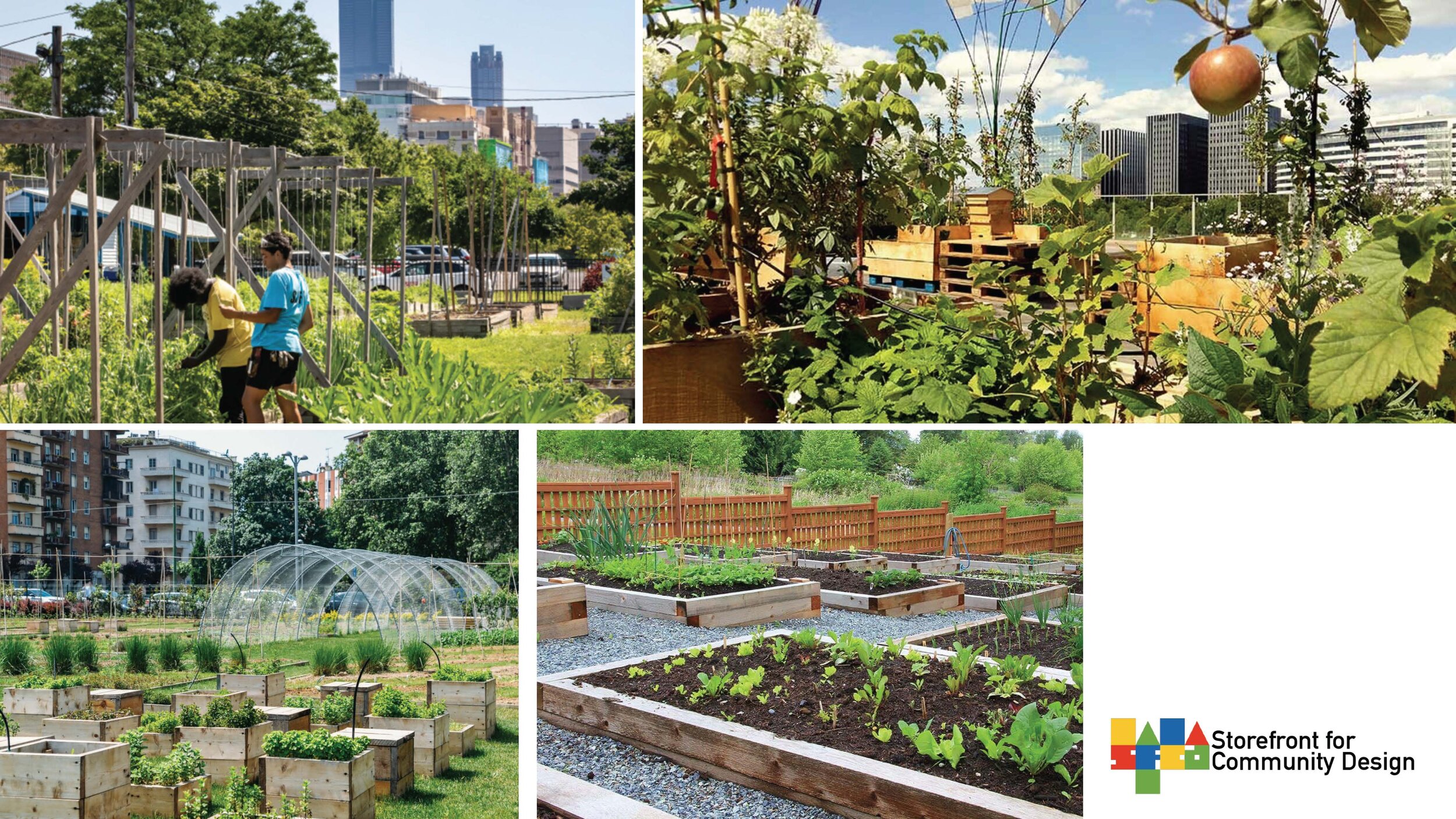
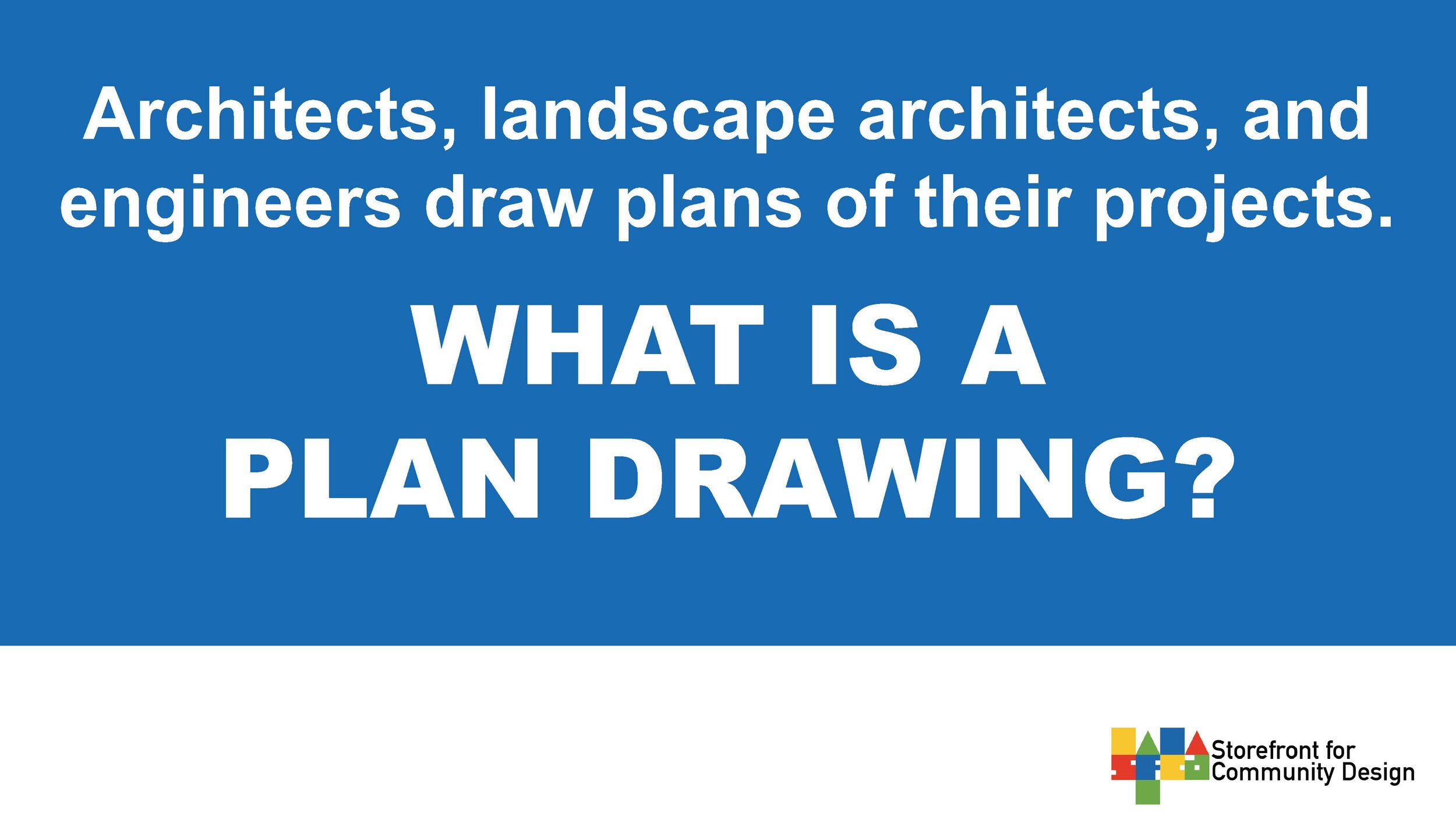
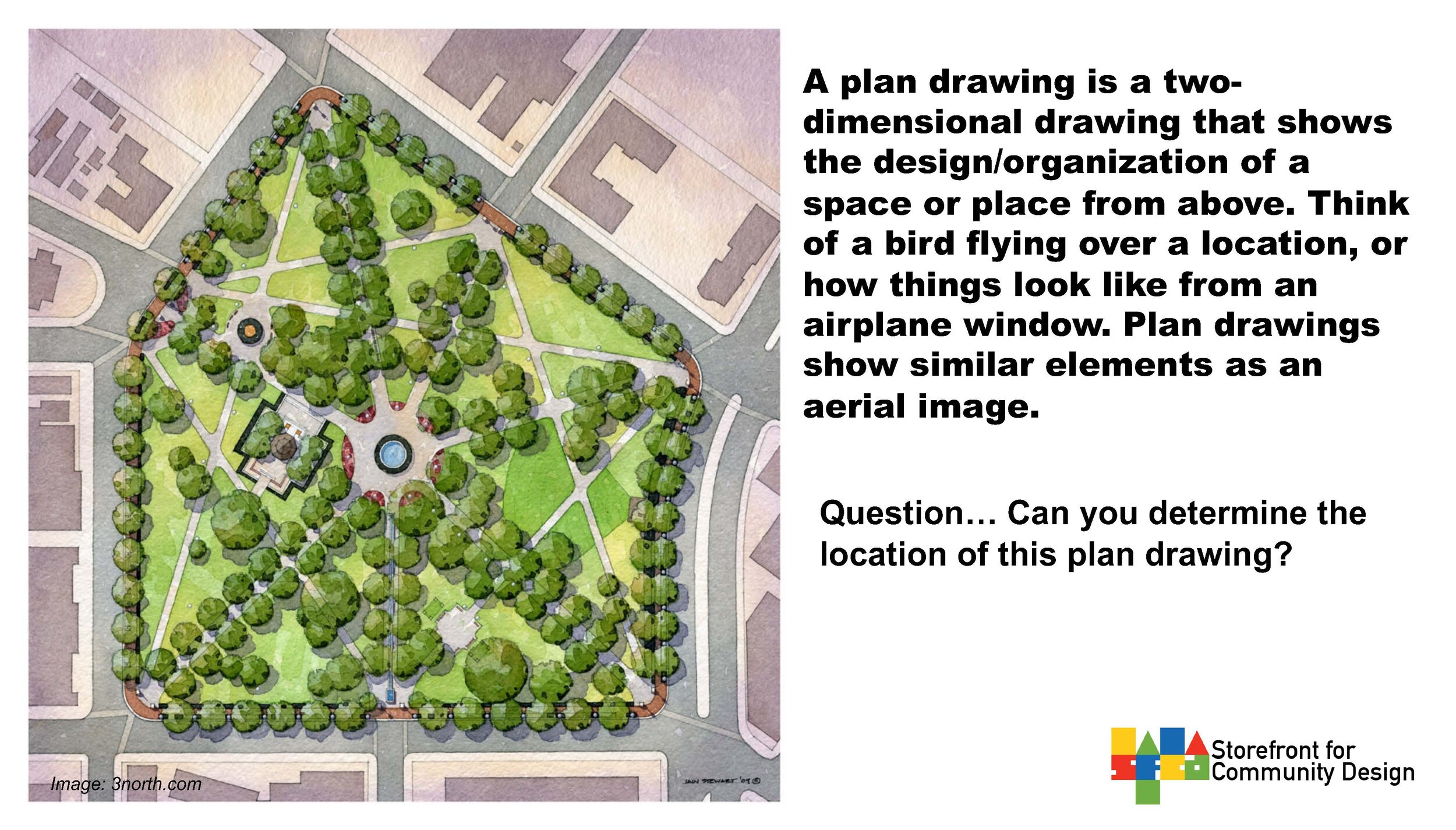
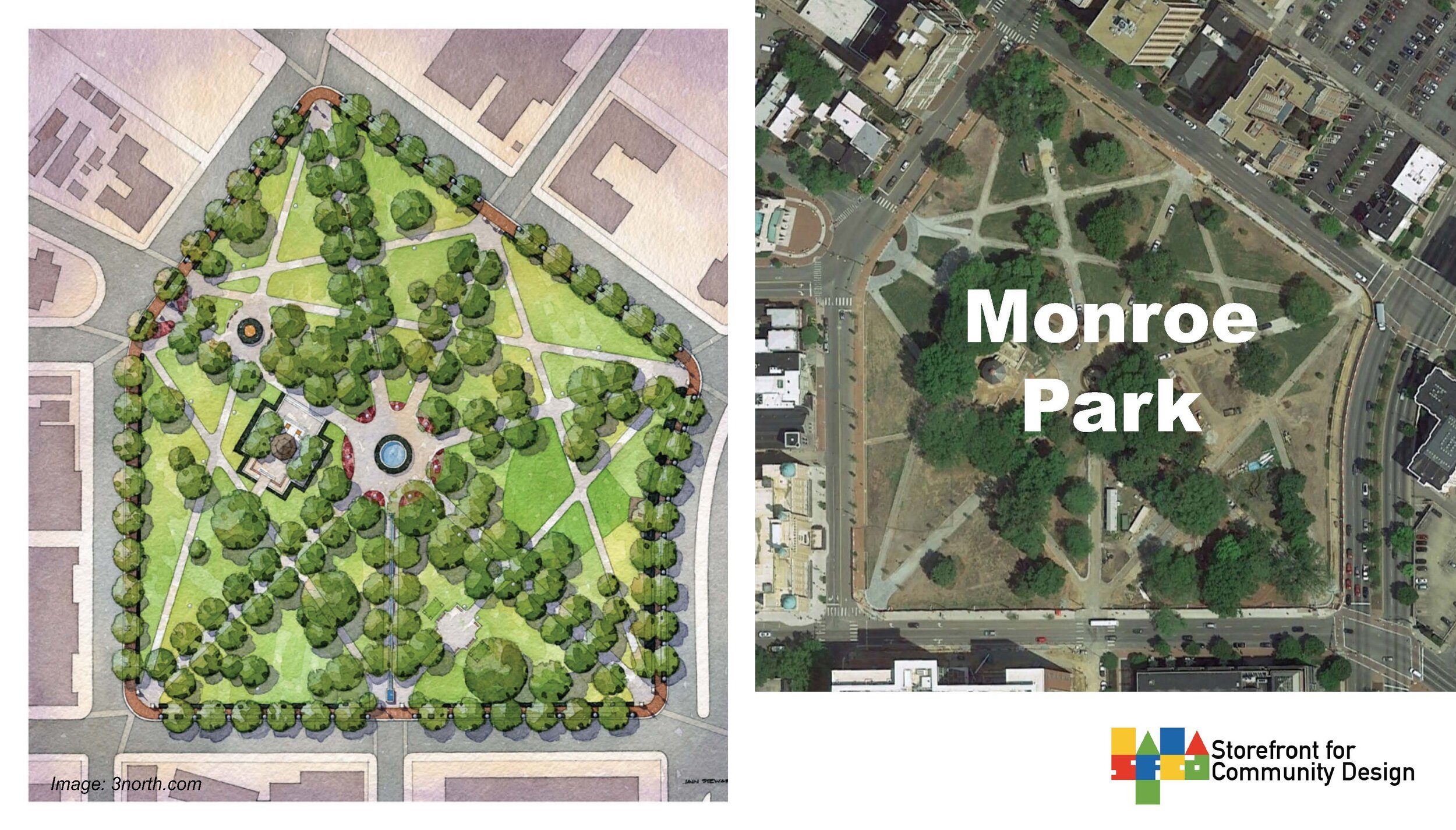
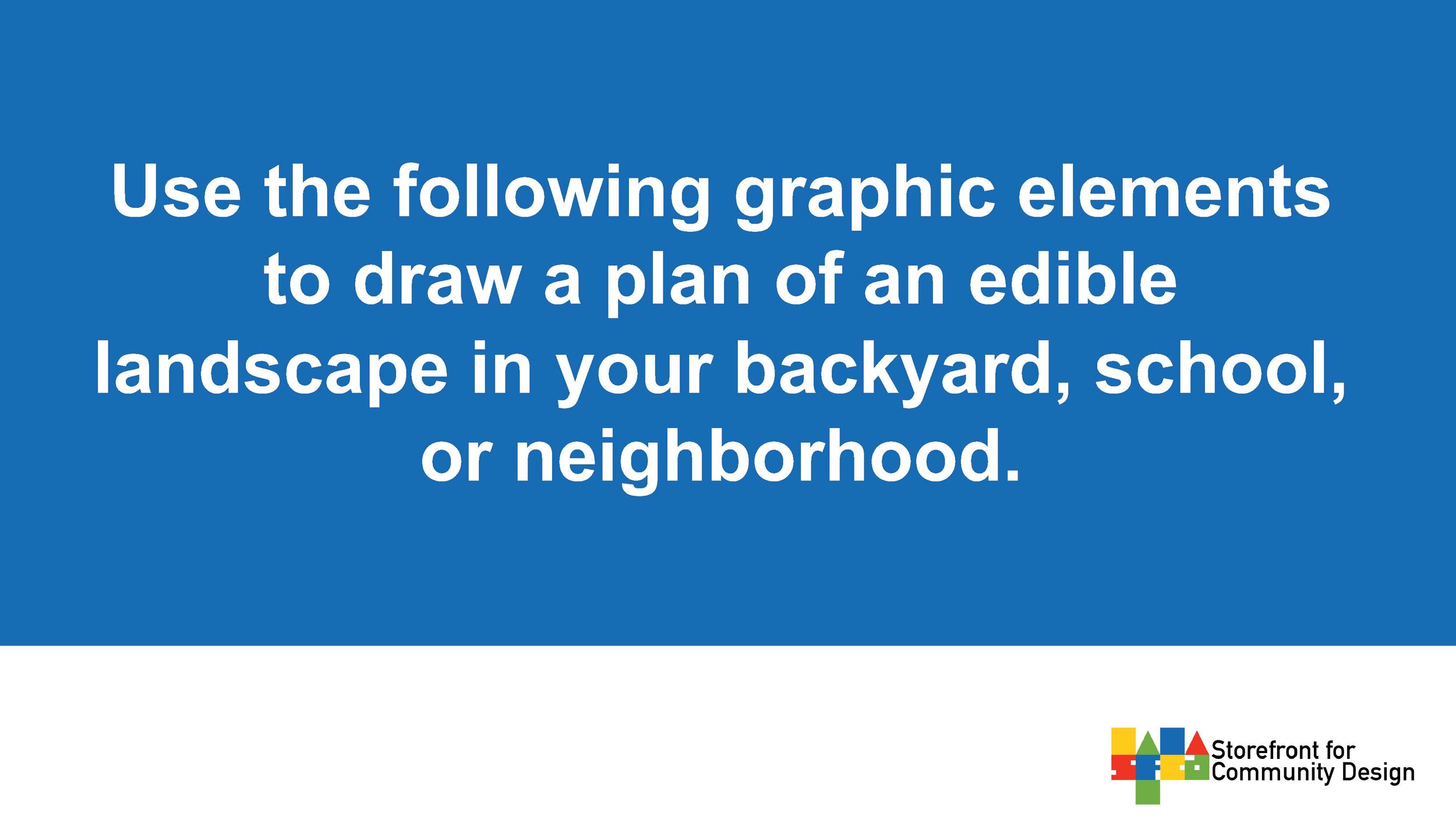
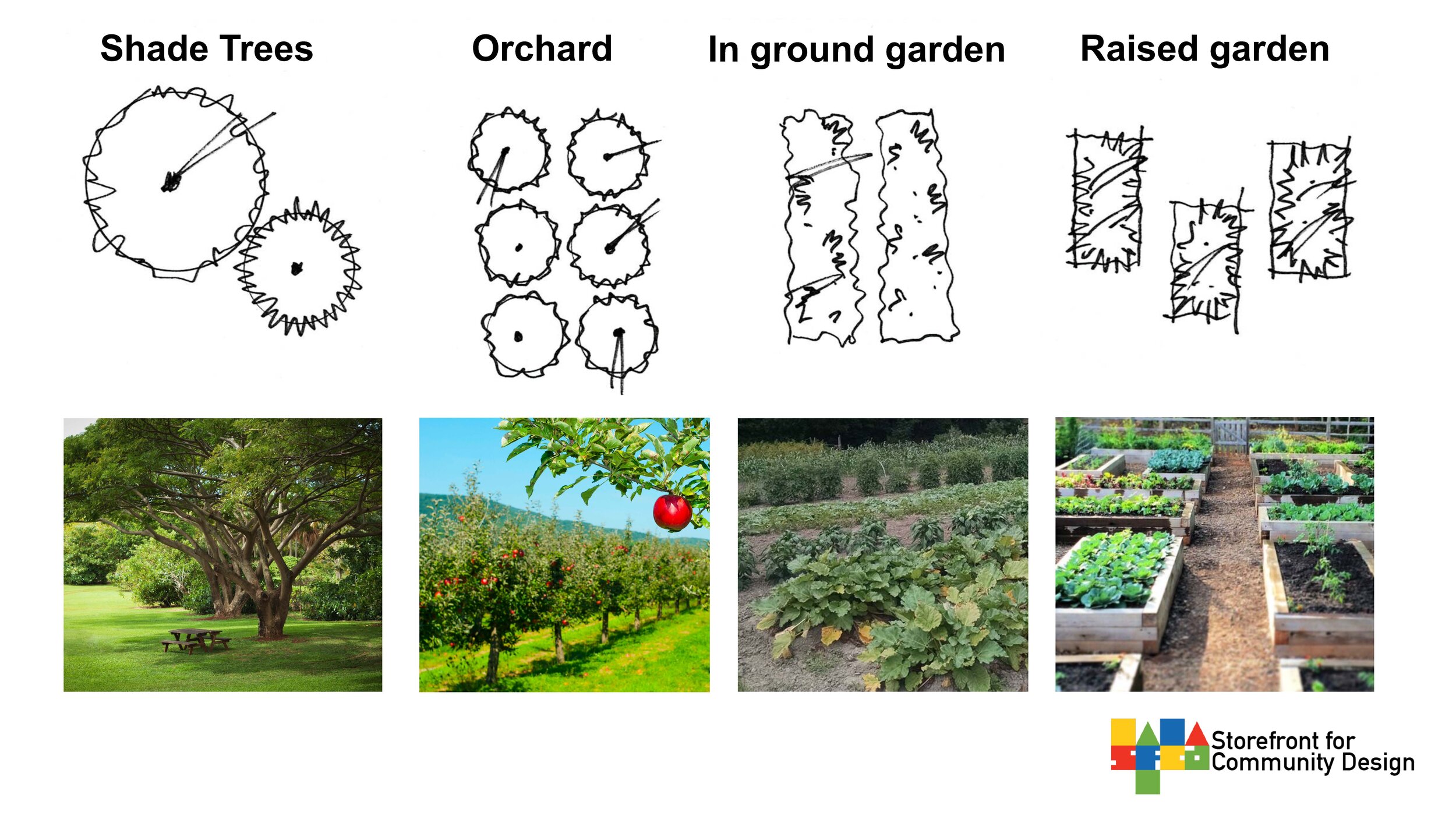
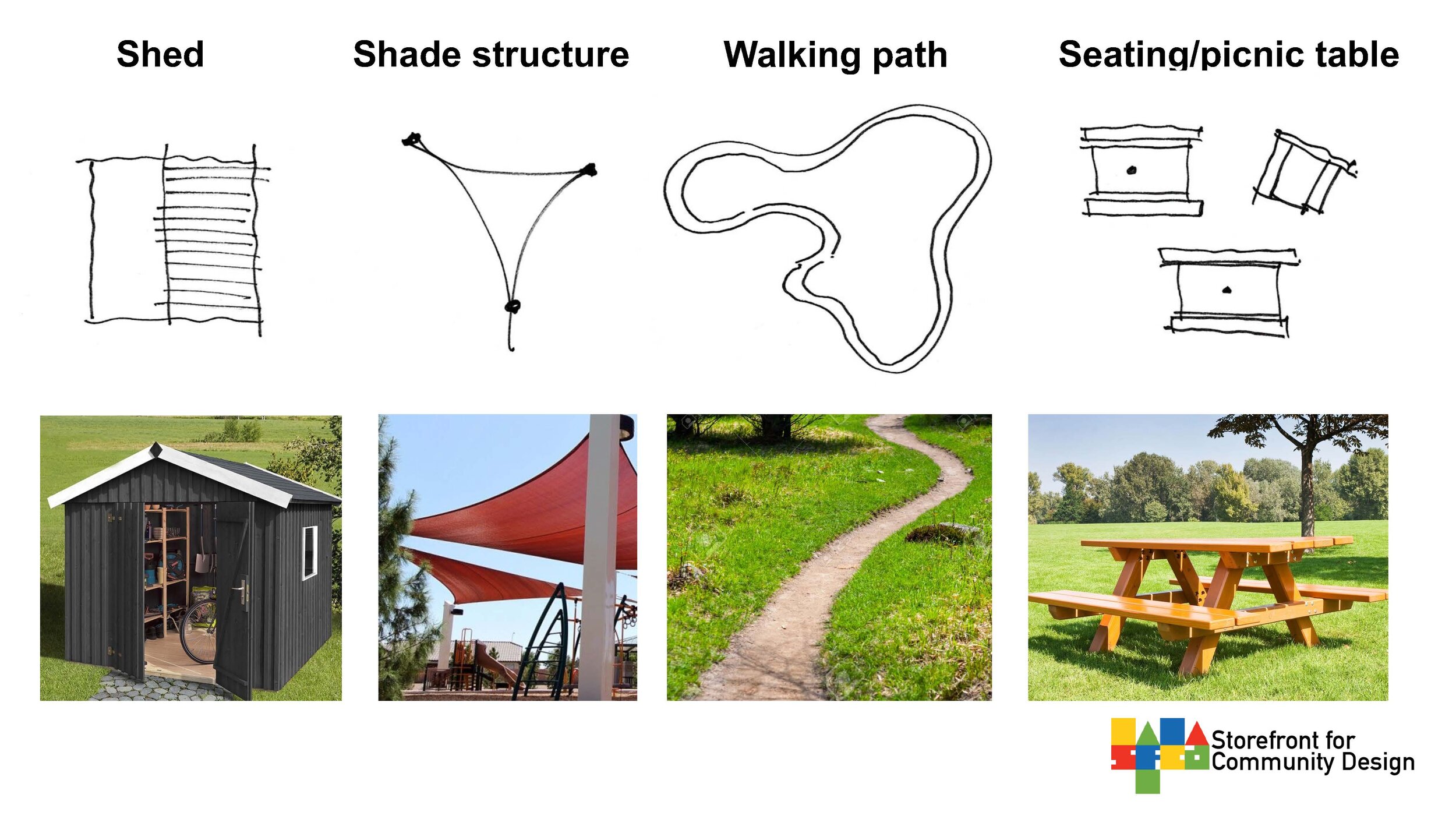
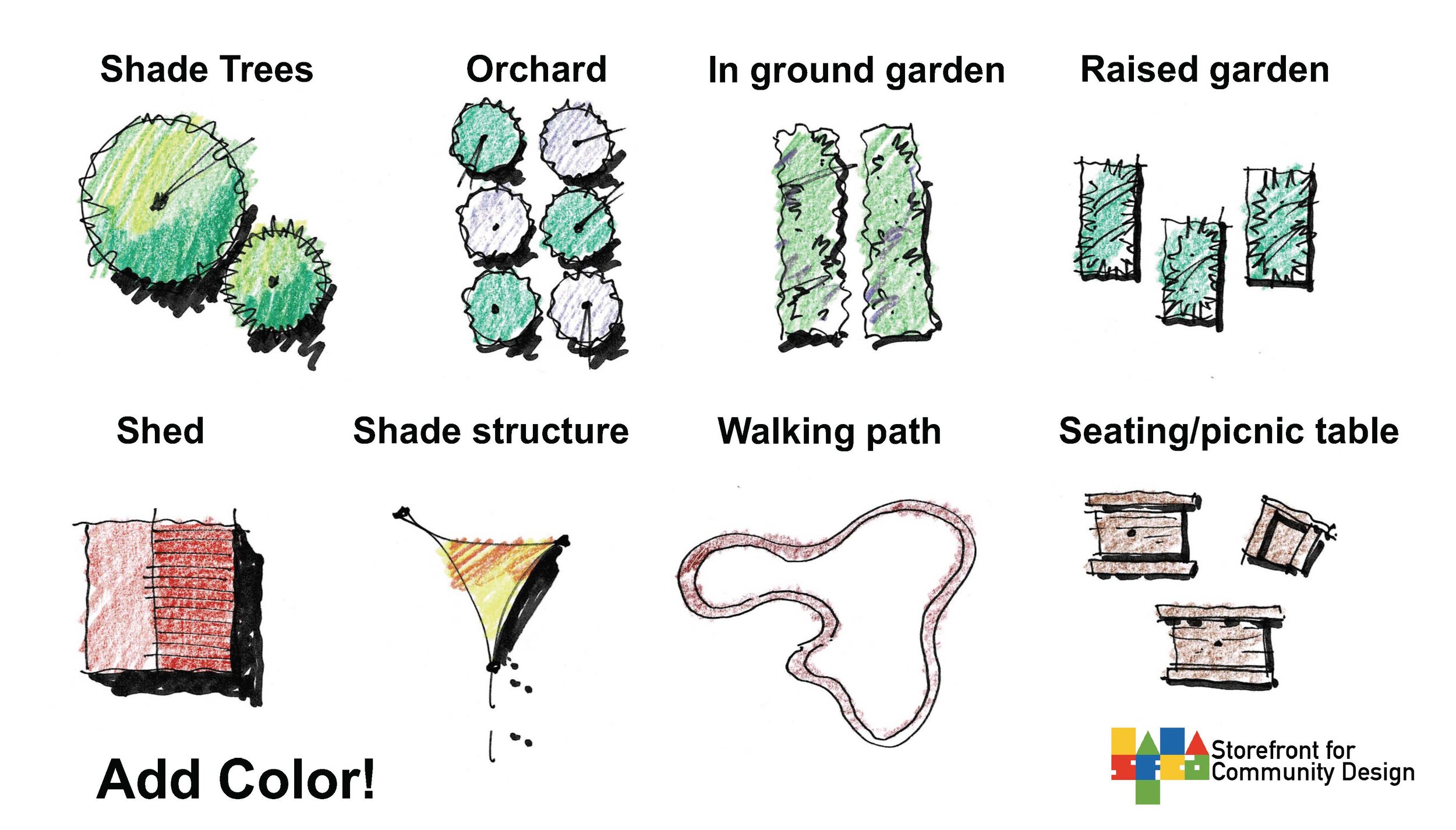
image: concept plans/ideas developed by participants in the food forest design workshop
City Builders Design Workshop
Storefront for Community Design’s City Builders Design program convenes project-based learning opportunities that focus on real world issues in the built environment and encourage youth and young adults to discover and design solutions that create effective change in their lives and communities.
04 | Recovery by Design
[10 Years, 10 Stories of Impact series]
It all began with a serendipitous ask for a gallery space to host an Annual Art of Recovery Art Show as part of National Recovery Month. The stars aligned when Laura Minnick, Coordinator of Consumer and Family Affairs at Richmond Behavioral Health Authority (RBHA), was attending a Board meeting where a colleague mentioned Storefront for Community Design as a potential location to hold the next art exhibit. RBHA reached out to Storefront and a partnership would soon blossom that not only included a one-time art exhibit, but an eight-week summer session for adults with lived experience of mental illness and/or substance use disorder.
Storefront collaborated with the faculty of mOb studio and RBHA to write two successive National Endowment for the Arts (NEA) grants that would provide funding to plan, host, and facilitate multiple summer sessions. In March 2014, the journey of discovery and healing began for each of the 43 participants involved in the program.
[10 Years, 10 Stories of Impact series]
It all began with a serendipitous ask for a gallery space to host the Annual Art of Recovery Art Show as part of National Recovery Month. The stars aligned when Laura Minnick, Coordinator of Consumer and Family Affairs at Richmond Behavioral Health Authority (RBHA), was attending a Board meeting where a colleague mentioned Storefront for Community Design as a potential location to hold the next art exhibit. RBHA reached out to Storefront and a partnership would soon blossom that not only included a one-time art exhibit, but an eight-week summer session for adults with lived experience of mental illness and/or substance use disorder.
Storefront collaborated with the faculty of the mOb studio and RBHA to write two successive National Endowment for the Arts (NEA) grants that would provide funding to plan, host, and facilitate multiple summer sessions. In March 2014, the journey of discovery and healing began for each of the 43 participants involved in the program.
“What a dream! Recovery by Design is a highlight of my career in behavioral health. I believe so much in the arts and when we involve people in other things outside of a typical doctor’s visit, they heal. I saw this happen with this partnership — people blossomed. ”
image: Participants created raw and beautiful visual art
The mOb studio faculty, grads, and students designed the curriculum, organized the supplies, space, and sessions, recorded and led sessions, and created a final publication. “As an individual, I volunteered to create one session of content for each summer program and to teach that session along with numerous volunteers from RBHA, Storefront, and students from the mOb studio,” said Kristin Caskey, Associate Professor in VCUarts Department of Fashion Design + Merchandising, “these were not workshops with one person standing in front of a room, but rather individuals working side by side, having conversations, and following participants’ leads as they made work that communicated their voice.”
One major goal of Recovery by Design was to destigmatize mental illness and substance abuse disorders. By using design and design processes, partners were able to co-create work that was later exhibited to the public, published, and through the process, become friends with some of the participants. Partners and students in the mOb studio were deeply invested and witnessed the power of design as part of the healing process. They saw that a simple task of putting brushes in hands, breaking down barriers, and simultaneously sharing stories and thoughts with those once thought as strangers, would create a collection of special drawings that can be easily flipped into impactful solutions.
One solution can be found on Second Street in downtown Richmond. Kerry Harlow and Miranda Leung, VCU students at the time, were inspired by the art created in the Recovery by Design program. They took the initiative to design and oversee the installation of a billboard that would soon show the work of past participants and provide information for those community members looking for a path to recovery.
image: Students from the mOb studio pose in front of the RBHA billboard designed by participants and mOb students.
Words cannot capture the deep appreciation that we feel towards everyone who participated in this project. Thank you one and all, and especially to our friends in recovery. You are all champions. We thank you for your courage, determination, and the hope that you are spreading to others. We look forward to future partnerships with Storefront for Community Design and the mOb studio! It is our dream to share our experience and the knowledge that recovery does happen.
— Laura Minnick, Richmond Behavioral Health Authority
WE NEED YOUR SUPPORT!
We can only continue because of your generous support that makes it possible for Storefront to create impactful and consistent programming like Recovery by Design. In honor of our 10th anniversary and to ensure future funding, we are laying the foundation for the next 10 years of community impact. Money raised will be invested in a variety of ways that, taken together, are designed to increase Storefront's mission and programming that will bring positive change to Richmond communities over the next 10 years.
10 YEARS, 10 STORIES OF IMPACT
Follow Storefront for Community Design’s 10 Years, 10 Stories of Impact series to learn more about our impact over the last ten years and check out a timeline of milestones for an overview of our work.
01 | Storefront is Born
02 | Ms. Thompson’s Kitchen
03 | mOb + Storefront = ❤️
04 | Recovery by Design
05 | A Celebration of Community Design
06 | Designing an Innovation Center
07 | Building a Brave Space
08 | General Demotion / General Devotion
09 | Community Driven Design Process
10 | A Vision for the Future
Notes from the Field: August Program Highlights
Storefront for Community Design operates three main community-based studio programs: Youth Innovation, Design Session, and Community Engagement. Check out our latest highlights for each studio below. If you’re interested in getting involved, check out our summer volunteer opportunities.
Youth Innovation Studio
The Youth Innovation Studio provides project-based learning opportunities that engage youth and young adults in real-world problem solving while providing a safe space to build the capacity to create effective change in their lives and communities.
Summer Session
Thanks to our partnership with Partnership for the Future, Storefront had the opportunity to work with two youth interns this summer. Our interns were given the opportunity to select, participate, and complete a project from our implementation plan. We wanted to make sure that while leadership created the implementation plan, youth voices were heard and involved in the process. During this process, our youth interns engaged in conversations with the community, visited designers and their spaces, assisted in the remodeling of the 6PIC space, and helped to lead various parts of our volunteer days with Mending Walls.
Storefront for Community Design operates three main community-based studio programs: Youth Innovation, Design Session, and Community Engagement. Check out our latest highlights for each studio below. We are also developing new ways to volunteer with Storefront, so be on the lookout for our new volunteer form coming later this year!
Youth Innovation Studio
The Youth Innovation Studio provides project-based learning opportunities that engage youth and young adults in real-world problem solving while providing a safe space to build the capacity to create effective change in their lives and communities.
Summer Session
Thanks to our partnership with Partnership for the Future, Storefront had the opportunity to work with two youth interns this summer. Our interns were given the opportunity to select, participate, and complete a project from our implementation plan. We wanted to make sure that while leadership created the implementation plan, youth voices were heard and involved in the process. During this process, our youth interns engaged in conversations with the community, visited designers and their spaces, assisted in the remodeling of the Six Points Innovation Center (6PIC) space, and helped to lead various parts of our volunteer days with Mending Walls.
Storefront staff and summer interns learned how to screen print at Studio Two Three.
Jonah, a rising sophomore with an interest in photography, art, and community was tasked with designing our informational flyer for 6PIC. The one pager was designed to educate prospective partners, community members, youth, and young adults about how the 6PIC space is used and how they can get involved. Evyn, a rising senior with an interest in design, entrepreneurship, and real estate worked on using the resources available to stage the 6PIC space for prospective rental use. She also worked with staff to develop a new webpage for space rentals that launched earlier this month.
We made sure to visit several sites to gain exposure to design in various elements and professional settings. Storefront would like to thank Baskervill, Studio Two Three, the City of Richmond Department of Parks, Recreation, and Community Facilities, and various community members who collaborated with us this summer to provide an opportunity to engage in design.
We ended the summer planning for National Night Out. Our interns coordinated and organized our giveaway and organized mindfulness kits provided by HandsOn Greater Richmond. Thank you Evyn and Jonah for your design work!
Storefront’s Youth Innovation Studio is putting our final touches on the upcoming City Builders curriculum and has begun recruiting for the Fall 2021 semester scheduled to begin September. Please contact us for more information.
Storefront staff and summer interns learn about architecture at Baskervill.
Design Session Studio
The Design Session Studio provides a low-cost design assistance program that offers one-on-one advice, conceptual sketches, and plans of action from volunteer design and planning professionals to residents and community members that builds the capacity to create new ideas.
Project Highlight: Hillside Court Mini-Farm
Earlier this summer, we wrapped up a Design Session envisioning a Mini-Farm at Hillside Court in Southside with resident Asia Goode and her Groundwork RVA team. Asia’s idea began as an effort to provide her community with the means to produce their own food, encourage spending time outdoors, and understand the health benefits that come with it.
Storefront volunteer Chloe Hawkins, a landscape architect based in Charlottesville, brought this vision to life in a vivid conceptual rendering to use for future community engagement and fundraising efforts. Extra thanks to Chloe for making those Richmond site visits!
“A Vision for the Hillside Court Mini-Farm” created by Asia Goode, Groundwork RVA, Storefront for Community Design and Chloe Hawkins
““Thanks for making this thing that was in our brains real!” ”
Chloe also brought her technical skills and permaculture background to build on Asia’s ideas. Through several work sessions, the team collectively designed a base map for the farm while building in climate resiliency. The map helped identify an ideal arrangement of the farm based on the site that includes an accessible entrance and gathering space, garden beds, an orchard, a wildflower rain-garden, a learning area, and a storage space connected by a gravel path.
Storefront staff, Groundwork RVA staff, and volunteers on a Design Session review.
→ Speaking of climate resiliency...we’re reading: The Seas Are Rising. Could Oysters Help?
Community Engagement Studio
The Community Engagement Studio provides engaging workshops, design discussions, and special events that educate and inspire community members to take action and create a shared vision that strengthens our neighborhoods.
Design Resources for Community Projects and Get Involved!
Earlier this year, we wrote about Storefront’s community engagement process to receive feedback and ideas from residents for the new intended use of the former Bank of America building in Northside’s Highland Park community. Since the development of the final report, Maggie Walker Community Land Trust (MWCLT) developed a Request for Proposal (RFP), held a community meeting to review the process and RFP, and organized an informational session to review the RFP with potential applicants. The RFP launched in early June and applicants are encouraged to submit proposals by September 8.
There have been many neighborhood discussions since the start of our effort and there are still opportunities for community members to share ideas and concerns - don’t miss your chance! MWCLT will be holding a virtual Citizens Advisory Panel meeting on August 25 at 5:30pm. Individuals who are planning to submit a project proposal for the building will be presenting their ideas to the panel and community members during that meeting. Sign up to attend!
In the meantime, if you’ve been wondering “What is an RFP,” we’ve got you covered! Check out a recent post to demystify a Request for Proposal.
Six Points Innovation Center Makeover and In-Kind Requests
This summer marked the 4th anniversary of Six Points Innovation Center (6PIC), a collaborative work space for non-profit organizations, youth, and community members. Storefront for Community Design opened 6PIC in June 2017, in collaboration with four other partner non-profit organizations, to provide a place to express creativity, help youth learn a multitude of skills, and, most of all, connect with community members.
To celebrate, 6PIC partners decided to begin rebuilding from the inside out. The partners worked on two projects that would provide a makeover to the space before resuming operations, space rentals, and programming in the fall of 2021. The first project was a collaboration with Storefront’s Design Session Studio to create a vision for the interior space. The second project included a collaboration with Mending Walls and HandsOn Greater Richmond to refresh and repaint the space.
We Need Your Help!
As we look to the fall semester, we are still in need of in-kind furniture donations. Check out the 6PIC Interior Space Design Session below for an itemized list of furniture and contact us if you have potential donations!
This summer marked Six Points Innovation Center’s (6PIC) 4th anniversary. Storefront for Community Design opened 6PIC in June 2017, in collaboration with four other partner non-profit organizations, to provide a collaborative work space to express creativity, help youth learn a multitude of skills, and, most of all, connect with community members.
To celebrate, 6PIC partners decided to begin rebuilding from the inside out. The partners worked on two projects that would provide a makeover to the space before resuming operations, space rentals, and programming in the fall of 2021. The first project was a collaboration with Storefront’s Design Session Studio to create a vision for the interior space. The second project included a collaboration with Mending Walls and HandsOn Greater Richmond to refresh and repaint the space.
We Need Your Help!
As we look to the fall semester, we are still in need of in-kind furniture donations. Check out the 6PIC Interior Space Design Session below for an itemized list of furniture and contact us if you have potential donations!
Project #1: 6PIC Interior Space Design Session
In May, Storefront staff and 6PIC partners met with Joy Whitehurst, Storefront’s Design Session volunteer to design a plan to re envision and re-invigorate the 6PIC space. The first meeting provided the opportunity for partners to share how they use the space and provide input on design ideas. It was unanimous that the space needed to remain flexible for a multitude of uses. In June, Joy finished up her design concepts and presented them to the partners. It was exciting to see the varying ways the space could be used and how new furniture could make the most impact for future programming. The plans provided a vision that has helped 6PIC partners remodel the space over the summer and discover fun and flexible furnishings.
Joy Whitehurst, Storefront Design Session volunteer, presents layout options for the 6PIC space.
Stationary and flexible furniture ideas for the 6PIC space
We Need Your Help With In-Kind Contributions!
The 6PIC space is still in need of in-kind furniture donations. We are looking for lightly used modern furniture that aligns with the furniture ideas image shown above. We have also listed specific items below. Contact us if you have potential donations!
Moveable desks and tables
Stools
Desk chairs with wheels
Book shelves
Couch (or two!)
Smart TV
White board on wheels
No furniture to donate? No worries! Give today to provide funding that makes it possible for Storefront and 6PIC partners to continue providing a youth-driven, non-profit collective space in Richmond's Northside.
Project #2: Collaboration with Mending Walls and HandsOn Greater Richmond
On what seemed like the hottest day in July, 6PIC partners indulged in a little self care. It took two days and 20 volunteers each day to move furniture in the 6PIC building, clean the space, and add a fresh coat of paint alongside the original Hamilton Glass mural.
Hamilton Glass, a former architect, is the creator of Mending Walls, a public art project designed to bring artists of different backgrounds together to create a space for conversation. Glass returned to Highland Park this time to support artist Khalid Thompson and Julianna Bustillo as they partnered with the Richmond Association of Black Social Workers to create a mural that exemplified symbols that represent their guiding principles and align with Storefront’s values of creativity, inclusion, and diversity.
“Your thoughts create your reality and your environment impacts your thoughts. Although we have been eager to open and meet the needs of our young people, we have to be mindful and intentional about the space and energy we are bringing them into.”
A huge THANK YOU goes out to Mending Walls, Handson Greater Richmond, Storefront’s Design Session Studio, and all of our volunteers who helped with 6PIC’s makeover throughout the summer!
03 | mOb + Storefront = ❤️
[10 Years, 10 Stories of Impact series]
Some may say there’s a fluid access to design thinking (and dreaming) in academia that becomes increasingly difficult to tap into as we immerse ourselves in professional practice. At the same time, getting impactful hands-on experience can be a challenge to find in a structured curriculum.
Storefront for Community Design’s partnership with mOb studio through the Design Session Studio program fills this gap and offers students the opportunity to work on innovative projects with the community in the City of Richmond.
[10 Years, 10 Stories of Impact series]
Some may say there’s a fluid access to design thinking (and dreaming) in academia that becomes increasingly difficult to tap into as we immerse ourselves in professional practice. At the same time, getting impactful hands-on experience can be a challenge to find in a structured curriculum.
Storefront for Community Design’s partnership with mOb studio through the Design Session Studio program fills this gap and offers students the opportunity to work on innovative projects with the community in the City of Richmond.
In 2012, three friends and VCUarts professors, Kristin Caskey, John Malinoski, and Camden Whitehead, founded mOb studio, VCUarts' experimental design lab, uniting their respective departments of Fashion Design, Graphic Design, and Interior Design. With a shared mission of improving quality of life through design, Storefront for Community Design joined forces and moved from it’s 25th Street location to a shared storefront space at 205 E. Broad St.
““This partnership is at the core of the mOb studiO, providing a critical link allowing our students projects and access to people and places in the City of Richmond that most students and faculty could not access””
image: Camden Whitehead, John Malinoski and Kristin Caskey scope out a new home for mOb studio + Storefront in the early days.
Besides getting experience managing projects and forming community connections, it also serves as a primer for living in the city, how it works and the vast opportunities it affords. The program centers around understanding the power of design to constructively shape the city and offers students a model for alternative career paths in design. “This partnership is at the core of the mOb studiO, providing a critical link allowing our students projects and access to people and places in the City of Richmond that most students and faculty could not access” describes Whitehead.
Each semester, Storefront staff and mOb studiO faculty come together to identify projects and teams. Small student teams works directly with their community collaborator (client), a design practitioner as a mentor, and are supported by mOb faculty and Storefront staff.
Project Highlight: Shalom Farms’ Pop-Up Market
In 2015, Shalom Farms, a local organization addressing healthy food insecurity, asked mOb to design an alteration to their van to be used for pop-up markets bringing healthy food to different neighborhoods. Staff recently caught up with Colleen Brennan, a mOb alum who led the mOb team in designing a functional pop-up market van.
image: Concept for breathable fabric baskets, grommets allow the baskets to be easily removed for washing.
Image: Concept for “Lazy Susan” shelves
“mOb totally changed my career trajectory. I was on a path to becoming an artist/furniture maker when I joined the studio. But, I was introduced to the field of landscape architecture and urban design through mOb and was so energized by that kind of collaborative, public work.”
Like many, Brennan found her way into mOb as a Crafts major looking for more connectivity. "I really craved more collaboration and interdisciplinary work than I was getting in the fine art school, and I wanted to work more directly in the public realm through socially-engaged design" shared Brennan.
“Shalom Farms' work addresses healthy food insecurity, which was an issue that really interested me as it bridges the landscape, urban infrastructure, and the body scales. The graphic designers on the team did an amazing job with a branding package and educational signage for the farm, while the rest of the team worked on a pull-out shelving system to transform the van into a market.”
Brennan recently graduated with a Masters of Landscape Architecture and joined a landscape architecture firm in Durham, NC called Surface 678. When asked how she’d describe mOb, she says “it’s like an interdisciplinary design studio...but we wear tyvek suits when we do things together.”
Image: mObjOB 7—FRED (Free Reusable Everything Desirable) with Aberrant Architecture
Project Highlight: Tyvek Suits and FRED
You may be wondering “what are tyvek suits?” The suits are a purposeful unifying tool and show up at public mOb happenings like mObjOb, a bi-annual design-build initiative led by a visiting designer. For example, in 2016 mObjOb was held and FRED (Free Reusable Everything Desirable) was born as a vehicle for connecting communities and dispersing needed items.
mOb alum An Liu shared his memories on this project with us: “Building FRED is a whole team effort. We had architect Kevin Haley from Aberrant Architecture, a London based architecture studio. For the first time, I was able to truly collaborate with all the mObians from different majors and different expertise.” When building was complete, the studio paraded FRED to nearby neighborhoods wearing their signature suits.
“Time flies, many years passed, but FRED is still around, it has been turned into other forms to serve the communities. That mission, the secret mission of making this planet a better place for all lives to live is growing in my heart, day by day” says Liu. An Liu is currently a concept-driven designer at SMBW, a Richmond-based architecture and design firm, and adjunct faculty in the Department of Interior Design at VCUarts.
Image: mObjOB 7—FRED (Free Reusable Everything Desirable) with Aberrant Architecture
““Time flies, many years passed, but FRED is still around, it has been turned into other forms to serve the communities. ”
mOb has over 200 alumni now who are well into their design trajectories and frequently come back to serve as mentors for mOb prOjects and other initiatives. We asked alums to share their memories and how mOb has changed their design practice:
“Learning how to design WITH communities instead of FOR them. I always ask myself that in my studio practice now. This slight shift has changed how I compose myself as a designer.”
“Designing the website to connect black expecting mothers with health professionals... That project taught me that even though it's a website, it's still a space and that knowledge in one area is always applicable to others.”
—Don Petties, mObian, 2021
“Showing up in our mob suits in Harrisonburg to install bamboo installations over the creek... In a world that can be so easily clouded by negativity mob always reminds me that positive solutions are out there!”
—April Zammit, mObian, 2016
“I remember making a skirt out of folded brown construction paper... it reminded me of model making for a space. The folds and seams add structure to fabric the same way folds and joinery add structure in furniture making / building making… changed the game for my brain”
—Emily Yenke, mObian, 2013
“When we filled the rams in recovery space with beanbag chairs. Sitting in a new way helped people overcome shyness and become generally more open in that space.”
—Thomas Kennedy, mObian, 2018
If you are an alum that would like to stay involved, with mOb studio, sign up as a Design Session volunteer and let us know if you’d like to be a mOb mentor!
We need your support!
We can only continue because of your generous support that makes it possible for Storefront and the mOb studio to create innovative solutions WITH communities across Richmond. In honor of our 10th anniversary and to ensure future funding, we are laying the foundation for the next 10 years of community impact. Money raised will be invested in a variety of ways that, taken together, are designed to increase Storefront's mission and programming that will bring positive change to Richmond communities over the next 10 years.
10 Years, 10 Stories of Impact
Follow Storefront for Community Design’s 10 Years, 10 Stories of Impact series to learn more about our impact over the last ten years and check out a timeline of milestones for an overview of our work.
01 | Storefront is Born
02 | Ms. Thompson’s Kitchen
03 | mOb + Storefront = ❤️
04 | Recovery by Design
05 | A Celebration of Community Design
06 | Designing an Innovation Center
07 | Building a Brave Space
08 | General Demotion / General Devotion
09 | Community Driven Design Process
10 | A Vision for the Future
CATEGORIES
TAGS
- Community Engagement Studio
- Design Session Studio
- Featured
- Volunteer Opportunities
- news
- Golden Hammer
- Design Session Outcomes
- architecture
- 6PIC
- Community Visioning
- Design Session
- landscape architecture
- community garden
- exhibitions
- design ideas
- social justice
- Justice
- Research
- adaptive reuse
- graphic design
- Bottom Up
- Monument Avenue
- Youth Innovation Studio
- Community Engagement
- mOb
- Community Engagement Reports
- Placemaking
- City Builders Design
- Monuments
- design competition

